Chile miners: Family's diary - September
- Published
Relatives of the 33 men trapped in a collapsed gold mine in Chile are camping near the shaft, waiting for news of their loved ones.
Four children of 56-year-old Omar Reygadas, a heavy equipment operator who has been working in mining for his whole life, are keeping a diary for the BBC.
29 SEPTEMBER
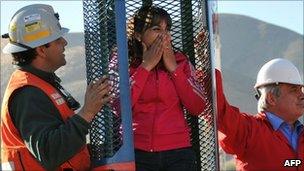
Relatives of the miners had the opportunity to check the capsule
Ximena: I never imagined that I would be able to get inside the capsule in which the miners are going to make it to the surface.
I was standing near to it with a cousin and my son and they asked if anyone wanted to get inside it.
I checked it very carefully.
It has a lantern and two hooks to keep steady. There is a phone so that they can talk to someone in case there is a problem while going up. They also have oxygen tubes.
It is very comfortable. I could fit on it while standing. It's big and there is sufficient room.
We were told that the perforation is progressing. The Strata 959, which is part of "Plan A" reached 476m. The other one, the machine working on "Plan B", perforated 204m.
They have said that the miners will be rescued in three or four months but we hope that it will happen earlier, as we have seen the capsules and the tubes in which they will travel.
I go to the camp every day after work. We stay there for the weekends.
The families are in high spirits. We are all impatient, but happy as we have seen how the machines are getting there fast.
19 SEPTEMBER
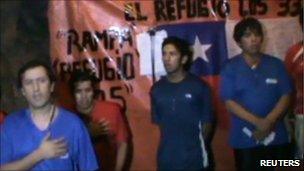
Miners sang the national anthem during the celebrations
Omar: We had a quiet bicentenary celebration. We didn't do anything special. We had a barbecue and spent time together and talked, without any music or dancing.
We had very different plans for this date. We were going to go to the beach to celebrate the anniversary. But since my father is now there, we've had to adapt. Even the organiser of the trip is down there with him.
The good news is that we were given eight whole minutes to speak to my father through a videoconference. All the family came for the weekend, so they all spoke to him.
He was very excited to see his older grandchildren. He threw them some kisses and sent them hugs.
There are 20 of us in the camp. Everyone brought their own tent and looked for a place to stay. They also brought some letters for my dad. We don't tell him anything that will make him feel uncomfortable.
I try to joke in my letters to cheer him up. I call him names, I invite him to have some beers with me and I tell him rude jokes.
He replies back with his usual good humour and reads all the letters patiently.
Our mission is to give him lots of hope because he can't afford to get depressed down there. That's what we worry the most about, we don't want him to get sad and stop eating.
We have to manage our anxiety. We want to be with our dad but we know things have to be done slowly for their own good.
I know we have to be patient, but I wish he was outside so that we could have a chat and I could hug him.
But as a family, we have had the serenity go through this. It's not the first time we have faced difficult times.
10 SEPTEMBER
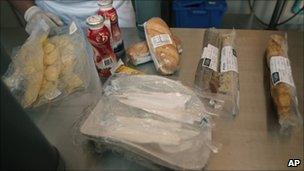
Miners have asked for a special treat for the bicentenary instead of the usual food
Omar: We watched a video in which the miners show us what they have been doing down below.
They have been inflating mattresses for the older ones. The smokers have been using nicotine patches to control their urge to smoke.
Their health is good. My dad has regained some weight.
He asked for plastic bags to keep his underwear and things, and pictures of his grandchildren and children.
Their mood is calm. They have adapted and are waiting to be rescued, but know that it will take a while.
They have plenty to entertain themselves: dominoes, playing cards, magazines. They now have a library in which they have books and the popular cartoon Condorito. He loves playing dominoes and is very good at it.
My dad told us we should do something on the bicentenary of Chile's independence on the September 18. The government wants the celebrations to be subdued, but my dad said we should celebrate and send him a video of the festivities.
Apparently, on that day we will have 15 minutes to talk to him, which is great.
They have asked for grilled steak for the bicentenary. Grilled, not cooked, because they want to be able to smell the charcoal.
Ximena: I heard that they are going to make a movie out of the miners' story. There are rumours circulating round - they even told us that there were some directors visiting the mine.
A miner down below is writing down everything that is happening. I think with all that has happened they will have plenty of material to make at least three movies!
7 SEPTEMBER
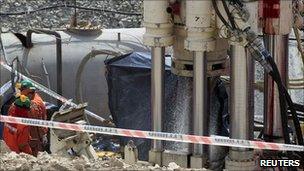
The Xtrata 950 drill has made a perforation 100 metres
Omar: This week I went back to work for the first time after the accident. I was staying here because my boss told me my job would always be here and that I shouldn't worry.
My sister Marcela and her husband will go up to the mine every afternoon to attend the daily meeting. My other sister, Ximena, also goes in the afternoons.
Ximena: My bosses have changed my shift in the supermarket so that I can take the bus at 1500 to go to the camp and return at night. My colleagues have been very nice to me since the accident and are happy that my dad is doing well.
Omar: The last they have told us is that the machine has made a perforation of a 100 metres, and that this is a good thing. They say the first 100 metres are the most difficult ones.
My dad told me he is leading one of the sections in which they have divided themselves. They have day and night shifts and decide who receives the "palomas" or packages and delivers the letters. Sometimes they have to do some mining jobs.
My dad was chosen because he has always proven to be a leader and has been their boss. He is very good at communicating with other people.
Ximena: We chatted with him on a videoconference and it was the first time he could see us. He asked about us and his grandchildren.
We have sent him a flag of Colo-Colo, his football team. With him in the mine there are some fans of Universidad de Chile, the arch-rivals, so he is happy because he can have a good argument.
He has asked for Chilean flags so that they can commemorate the bicentenary of Chiles' independence. We asked him if he would be upset if we celebrate. He said he wouldn't mind, as long as we don't drink alcohol.
5 SEPTEMBER
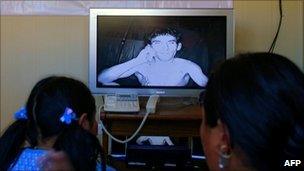
Relatives were able to hold videoconference calls during the weekend
Omar: This weekend we spoke to our dad on a short videoconference. We could see him but he couldn't see us. He told us he is doing very well. He shaved and had a haircut.
Ximena: Dad asked us for a watch, because he wasn't wearing one when the accident happened and he needs to keep track of time.
The Nasa experts have recommended that they divide their day in three sections - morning, work and night. This will help them have a routine.
We keep telling him only positive things and avoid talking about problems or money matters.
Omar: The camp is very cheerful during the weekends because there are more people. The children play, make drawings and write letters to their grandparents.
We spent some time with the famous four survivors of 1972's plane crash in the Chilean Andes. They shared their experience with us and gave us hope.
They told us the miners will get out of there stronger than ever before.
Ximena: This weekend, we marked one month of our relatives being trapped in the mine by blowing car horns and whistles. We have done that every week at 1430 local time, which is the time when the rock collapse happened.
Omar: I will have to go back to work on Monday, because I have a family and children to support. I would love to stay here at the camp but I have other responsibilities. But I will go up to the mine every weekend.
Ximena: We have organised our work timetables so that there is one of us here at the camp all the time.
1 SEPTEMBER
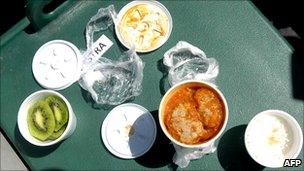
A sample of the first hot meal sent to the trapped miners
From Omar: At the last meeting, we saw a video of our relatives receiving their first hot meal. Before that, they were eating only liquids and baby food. Now they are being sent chicken, steak, ham sandwiches, jam and fruits.
They also have music to help them relax. They look in much better spirits, even the ones who looked badly affected by the situation.
My dad's favourite food is steak with avocado - he eats it with lots of avocado. But he hasn't been sent anything like that because the food sent has to first be studied by a nutritionist.
They have to watch what they eat and are on a special diet because they have to avoid getting fat as the hole in which they will be rescued has a diameter of around 70cm. So they have to stay thin and follow a strict diet.
Meanwhile, we wait. We hope the wait is not too long. We hope to see them in one month or more, but not three months or four.
But we are happy because my dad looks well, and he always sends his love to the family on the videos.
We hope to speak to him over the phone very soon. Phone calls are not frequent because that could depress them and make them feel nostalgic. A psychologist evaluates the possibility every day, and we follow his decision.
So we write to him every day, as does the rest of the family. We tell him we love him and that we are praying for him. We ask him to remain faithful. He also hopes to see us soon.
The letters are also checked by the psychologists. They check that we don't tell them things that could affect them - they don't need more problems that the ones they already have.
31 AUGUST
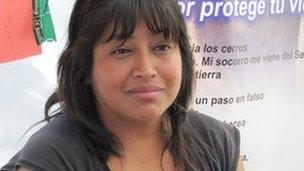
Marcela is worried about the humid conditions where her father is
From Marcela: The company which owns the mine is recommending that the relatives get away from the place. They say it is only normal for us to go home and go on with our lives, but we think that's a personal decision. They can't make us leave.
We have settled in the camp and plan to stay until 18 September, when we celebrate Chile's bicentenary. Then we will see.
They have started drilling the rescue shaft and we are waiting for a bigger machine to arrive.
My dad is doing well. Only my brother Omar was able to talk to him, because families have to select one member of the family for telephone communication. But my dad told him he feels okay. He asked us not to worry about him, that everything down there is fine and he doesn't need anything.
They have no comforts, of course, but he is calm and even asked for the wellbeing of other relatives.
They do suffer from muscular pains due to sleeping on the ground, but nothing serious. I understand they are sending them collapsible camp-beds. They have also sent them games such as playing cards and dominoes so that time goes by quickly.
I am worried because the place where they are is very humid and muddy. They are moving to another level of the mine because of that, and also because the drilling machinery uses a lot of water - so water is running down.
They have to take a lot of care to avoid skin infections. They're not shaving because they fear that any small cuts could get infected, and they have no medical attention down there.
One of them does have first-aid training so he is the one in charge of giving them the anti-tetanus shots that were sent to them.
They are very well organised. The miners who didn't get to appear on the first video appeared on the second one.
The miners know the rescue will take the effort of the people up here and down there. They will have to help each other.
I would like to thank all the people around the world who worry about the miners. All we ask is for people to pray for them to be rescued as soon as possible.
30 AUGUST
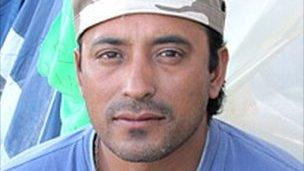
Omar is waiting for his dad to be rescued
From Omar: Me, my two sisters and a brother left everything and came here as soon as we found about the rock collapse. We slept in tents in what is now known as Camp Hope.
We lived through 17 days of anguish until we received the good news that they had survived. It is much better now because we know the conditions they're in, and we can chat and write to them.
Now my siblings have gone back to work in Copiapo, which is 40km from the mine. They will be back in the weekend and I will stay here. My boss has told me not to worry, because he understands what we're going through and knows my dad.
Life at the camp is not difficult. I keep myself busy. I sweep, clean and write letters to my dad. We have everything we need, showers and stoves.
The authorities hold a daily meeting at 1800 (local time). They tell as about the latest news and update us on the situation.
Translated from Spanish interviews by BBC Mundo. You can read the original text in Spanish here.